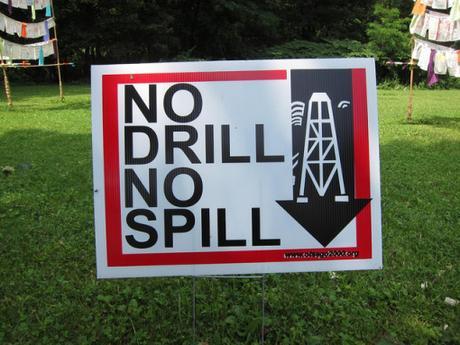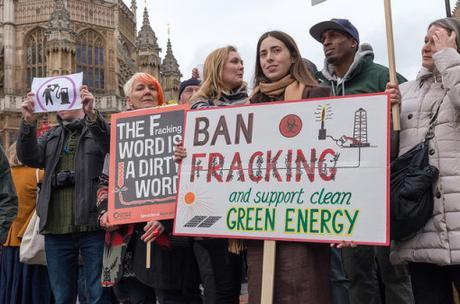What is Fracking?
Fracking is a relatively new way of accessing natural deposits of shale gas and oil buried deep within the ground. The process of fracking or hydraulic fracturing involves the injection of a mixture of sand, water and chemicals into an oil or gas well at high pressures to fracture the shale rocks to release the natural gas inside. Fracking is both an environmental and political issue. Hitherto inaccessible, we have managed to invent a way of getting down many thousands of feet into the earth to get essential fossil fuels out to use to heat our homes and cook our food, for instance. Fracking is not universally viewed as a good thing, however. Although it has given us access to new deposits of shale gas, it can have a huge impact on the environment (like other fossil fuels).
Fracking is different. The risks of any single well are tiny compared to a nuclear power plant. But several hundred wells? Several thousand?
– Russell Gold

Read here more about Fracking:
- What is Fracking?
- Pros and Cons of Fracking
Benefits of Fracking
There are a number of benefits of fracking as opposed to using other methods of extracting natural gas from the earth and from stones.
- Access To More Gas and Oil
Fracking allows us access to natural deposits of gas that we have not yet been able to get to with our other, traditional methods of extraction. Because fracking allows us to drill thousands of feet into the ground to get access to gas stored deep within the earth in stones far below the surface, we can get access to even more gas. This has a couple of upshots:
- Gas is becoming cheaper and cheaper – Because of its abundance, gas is a lot cheaper than it has been in years. With oil still commanding extortionate prices, gas is actually getting cheaper and cheaper because it is abundant not only in this country but in others all around the world. You can now heat your houses for much more reasonable prices than ever before.
- We have more time to adapt – Fossil fuels are a non renewable source of energy: we have known this for many years. However, we are not yet ready for them to run out. In order to give us more time to research safe and effective ways of powering our cars, heating our homes and cooking our food, we can now use this surplus of gas thanks to fracking.
Now gas can not only be found all over the world but it can also be accessed all over the world with relative ease, meaning that there is plenty to go around for the time being and for a short time into the future.
- Direct and Indirect Economic Impact
According to American Enterprise Institute, “The direct benefit of increasing oil and gas production includes the value of increased production attributable to the technology. In 2011, the USA produced 8,500,983 million cubic feet of natural gas from shale gas wells. Taking an average price of $4.24 per thousand cubic feet, that’s a value of about $36 billion, due to shale gas alone.” The increase in the production of natural gas has impacted the trade balance between US and other countries. In short, as a result of increase in fracking, natural gas imports reduced by 25 percent between 2007 and 2011.
According to EPA, natural gas based power stations emit much lesser carbon dioxide than coal power based power stations. As production of natural gas has increased in US, so has the production of electricity. Much of this increase has come from power stations that have switched from coal to natural gas due to increase in supply of it. The drop in prices of natural gas would result in reduction of electricity prices in the US.
- No More Relying on Foreign Countries
The politics of the world would be difficult enough without throwing energy problems into the mix. However, the lack of fossil fuels and the fact that they are not distributed evenly all around the world is a source of real tension amongst some of the most influential countries of the world. Because we now have more access to more gas deposits, however, we now no longer have to rely on other countries around the world for at least some of our fossil fuels. Instead, we can rely on ourselves to provide energy for our own residents. This could help, in the long run, to ease the tensions between some of the key countries in the world.
- Increase in Employment Opportunities
With the increase in production of natural gas, the number of people employed in production and delivery activities has also increased. As there are lot of oil and natural gas deposits that still needs to be tapped, the number of people employed in oil and natural gas extraction will only rise. The increase in use of fracking technology has seen 67% rise in employment – 118,400 in 2003 to 198,400 by December 2012.
- Reduction in the Levels of Air Pollution
One of the main complaints about fossil fuels is the fact that they cause air pollution. When oil and coal are burned they release carbon dioxide into the air, contributing to the overall amount of greenhouse gases in the atmosphere that are not so slowly contributing to and causing global warming. Besides carbon dioxide, coal also releases dangerous compounds and elements into the air such as sulfur, which is poisonous. Burning gas, on the other hand, does not release as much carbon dioxide into the air, meaning that, the more gas we burn (as opposed to oil or coal) the better the air quality will be over all. This can help to reduce the amount of greenhouse gases in the air and therefore slow global warming down.

Dangers of Fracking
Most people object to fracking as a method of extracting natural gas from the ground because of the dangers that it poses to the environment, to animals and even to humans.
- Environmental Issues
Although we said above that air pollution is less of a problem if more gas is burned (as opposed to coal or oil, for instance), there are actually ways in which fracking causes more problems of pollution in the world. There are a number of ways that fracking can affect the environment and add to the levels of pollution currently found throughout the world:
- Water Pollution – Because water that is full of dangerous chemicals is pumped into the ground in huge amounts (around 100 times as much as in the usual gas extraction techniques previously employed), more and more problems are being found in and around areas where fracking takes place. The water that is pumped into the ground is supposed to be extracted after the process of fracking. However, sometimes it does not rise up to the surface but rather seeps through the ground towards other water sources like rivers, ponds and even the sea. The chemicals that are in the water mix can cause problems for creatures and plants living in the water or relying on it for their survival. They can also cause problems for people who are drinking the water if the chemicals seep into reservoirs, for instance.
- Air Pollution – The process of fracking can actually release chemicals into air that are known to cause cancer such as benzene and methane. This happens just after the gas has been tapped but before the actual production begins, which means that it is not caught and therefore is released into the air that people and animals breathe.
- Noise and Light Pollution – For people living close to places where fracking is taking place, noise and light pollution can be a real problem. Fracking processes go on throughout the day and night, meaning that light pollution goes on at all times, and the heavy, noisy vehicles that bring materials and carry gas away can disturb the sleep of those living in the area of a fracking plant.
- Global Warming
Although, as described above, burning gas does not cause as much carbon dioxide to be released as burning oil or coal, it does still release carbon dioxide into the air. If we are relying on gas rather than trying to find new, alternative energy sources that are cleaner and do not cause problems for the environment, then we are still adding to the amount of greenhouse gases in the air. In the long run, this could still have hugely problematic effects on the environment and life on Earth.
- Can Lead to Drought Like Situation
According to this, there are more than 500,000 active natural gas wells in the US. Each gas well requires an average of 400 tanker trucks to carry water and supplies to and from the site. It takes 1-8 million gallons of water to complete each fracturing job. That means 72 trillion gallons of water dedicated to fracking the US oil wells. A city which is already facing acute water shortage, fracking on a large scale can lead to drought like situation.
- Exposure To Toxic Chemicals
Up to 600 chemicals are used in fracking fluid, including known carcinogens and toxins such as Lead, Uranium, Radium, Methanol, Formaldehyde, Hydrochloric Acid, Mercury, and Ethylene Glycol. Approximately 40,000 gallons of chemicals are used per fracturing. During the process of fracking, methane gas and toxic chemicals leach out from the system and degrade nearby groundwater. Methane concentrations are 17x higher in drinking-water wells near fracturing sites than in normal wells.
- No More Advancement
Because we are now relying on gas – especially because it is so cheap nowadays – since fracking is so effective at getting access to even the most difficult to reach deposits, we are not longer trying to find alternative energy sources. When we were worried about not being able to use cars, for instance, we started searching looking into solar powered cars. The danger with fracking is that we are no longer going to look for alternative energy sources as the sun or the wind. Instead, we will pump harmful chemicals into our environment and cause global warming to happen quicker.
References
Environmental Effects of Hydrofracking

